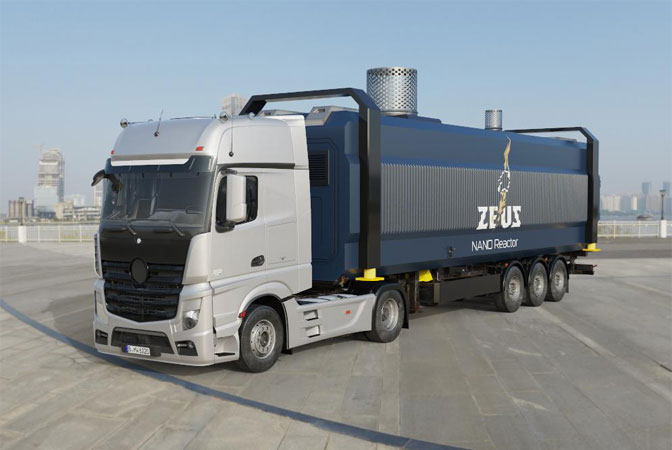
- All Instrument Types
- Indices
- Equities
- ETFs
- Funds
- Commodities
- Currencies
- Crypto
- Bonds
- Certificates
Please try another search

Fueling the Future: The Game-Changing Potential of NANO Nuclear's HALEU-Powered Microreactors
NANO Nuclear Energy, led by Jay Jiang Yu, challenges traditional perceptions with its innovative Small Modular Reactors (SMRs) and microreactors. These advanced solutions, including ZEUS and ODIN, offer safety, efficiency, and accessibility, particularly in remote areas, transforming the way we think about nuclear power's role in a clean energy future.

In recent years, the world has seen a surge in green solutions, among which offshore wind power and clean hydrogen have gained plenty of traction as governments around the globe recognize their potential to reduce our carbon footprint.
However, the ever-growing quest for an eco-forward future has one more—though frequently misunderstood—ally: nuclear energy.
A reliable, low-carbon power source, nuclear energy has been a formidable contender in the sustainability movement, holding the promise to reshape the entire energy narrative. That said, for the majority of people, whenever the word 'nuclear' is brought up, images of toxic waste, mushroom clouds, and reactor issues are often conjured up.
Jay Jiang Yu, the founder of NANO Nuclear Energy, highlights that in reality - nuclear energy is the safest form of energy. Moreover, it has played an instrumental role in a number of scientific developments aimed at bringing clean power sources and pushing the boundaries of what sustainability can actually mean.
One such development is Small Modular Reactors (SMRs) and microreactors. These compact powerhouses are not just scaled-down versions of their larger counterparts. They bring to the table a host of advantages that traditional nuclear reactors can't compete with, from enhanced safety features to a small footprint and modularity, which enables them to be deployed even in the most remote corners of the world, thus addressing energy access issues that have long plagued such regions.
Born out of a vision to revolutionize the nuclear energy landscape, NANO Nuclear Energy has swiftly emerged as a trailblazer in its industry, driven by a mission to make nuclear energy accessible, safe, and economically viable for all.
At the heart of the company's offerings are its advanced, portable solutions, mirroring its dedicated team's endeavors to shake up the status quo and leverage cutting-edge technology to develop compact and trustworthy reactors. Two of those are the on-demand ZEUS and ODIN microreactors, built to prevent overheating by harnessing the power of natural phenomena such as gravity and convection.
They are also designed to go where traditional reactors can't, bringing reliable, carbon-free electricity to places that need it most. "In the face of today's pressing energy challenges, we are committed to breaking new ground and bringing light to the most isolated corners of our world," says Jay Jiang Yu.
In addition to developing ZEUS and ODIN, NANO Nuclear Energy's subsidiary, HALEU Energy Fuel Inc., has had an additional focus: the development and manufacture of High-Assay Low-Enriched Uranium (HALEU) for its reactors, as well as for other SMR and microreactor companies. Reflecting on these efforts, Jay Jiang Yu explains that NANO's advanced reactors require sources such as HALEU to achieve their desired performance and safety characteristics.
"The use of HALEU can increase fuel in-core lifetimes, allowing these reactors to run longer without needing refueling," he says. "And, with higher concentrations of Uranium-235, HALEU offers a significant boost in energy output."
Nonetheless, HALEU isn't just an alternative fuel option for NANO Nuclear Energy - it's an essential component of the company's mission. Since the high density of HALEU means these reactors can generate more power per unit of volume, they are more compact yet no less efficient, making them crucial for deployment in hard-to-reach places.
As Jay Jiang Yu points out, remote and underserved regions face a unique set of challenges when it comes to energy access. "Geographic isolation, lack of infrastructure, and economic constraints often mean that these areas are left in the dark, both literally and figuratively. This is where HALEU-powered microreactors play such a huge part," he states.
By operating independently of traditional grids and providing a consistent power supply that can be trusted, NANO Nuclear Energy's microreactors can help overcome the hurdles these areas face. Jay Jiang Yu reiterates that the fact that HALEU-based reactors can run for longer periods without refueling makes them critical for remote locations where transporting fuel can be logistically challenging and expensive.
As a result, HALEU-powered microreactors can fuel local economic development and empower businesses, healthcare facilities, schools, and more. Furthermore, by replacing conventional diesel generators, which are often the only available source of electricity in underserved regions, NANO Nuclear Energy's microreactors can reduce dependence on fossil fuels, greatly contributing to a cleaner and greener future for all.
Yet, this is just the beginning. As we look to the future, the role of nuclear energy is set to evolve further—and NANO Nuclear Energy strives to stay at the center of this narrative. With its tireless commitment to innovation, there's no doubt that the company will play an even bigger role in shaping the future of not just nuclear energy - but of the sustainability movement, as well.
As Jay Jiang Yu says, "We have a long way to go, but my team and I will continue going above and beyond to lead toward a world where everyone has access to clean and reliable energy."





